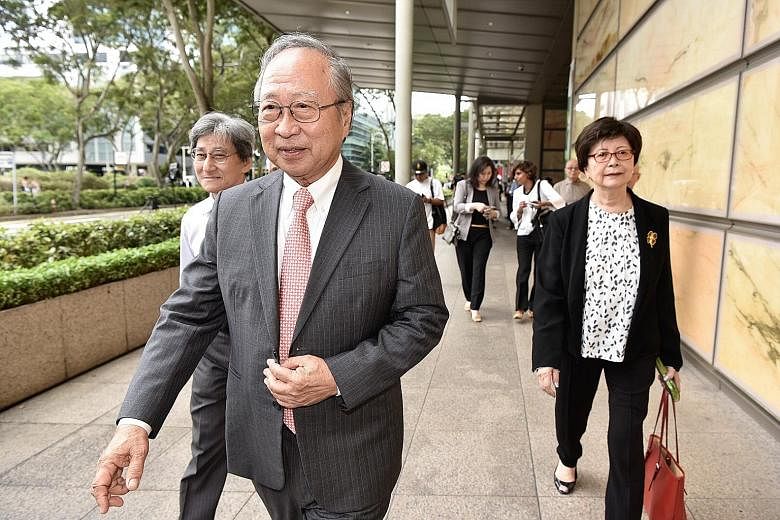The Court of Appeal yesterday unanimously dismissed the appeal of former presidential candidate Tan Cheng Bock on the timing of the reserved presidential election.
Dr Tan said in a Facebook post that he accepted the verdict with a heavy heart as he had wanted to contest the upcoming election.
He also wished those taking part in the election all the best.
The decision by the five judges, including Chief Justice Sundaresh Menon, clears remaining legal doubts about the Government's decision to reserve the election next month for Malay candidates.
It also paves the way for the Writ of Election to be issued, setting the election process in motion.
The apex court disagreed with Dr Tan's argument that it was unconstitutional for the Government to start counting the five terms to trigger a reserved election from that of President Wee Kim Wee as he was not elected by the people.
The Appeal Court upheld a July 7 judgment that Parliament has the right to count from President Wee's term, for the purposes of reserving the upcoming election for candidates from the Malay community.
-
The arguments
-
Dr Tan Cheng Bock:
•The definition of president in Article 2 of the Constitution refers only to presidents elected by citizens. Hence, Parliament could not specify President Wee Kim Wee's final term as the first of five terms to trigger a reserved election as he was elected by Parliament.
•Material such as parliamentary debates and the Constitutional Commission's report show Parliament intended to specify the term of a president elected by citizens as the first term.
•Parliament's decision to count President Wee Kim Wee's final term in office as the first term was based on misapprehension of the law, that he was a president elected by citizens.
Court of Appeal's reasons for dismissing the appeal:
•It is Parliament's right to decide when to start the count, and it is a fact that President Wee was the first president to exercise the powers of the elected president.
•The extraneous material submitted by Dr Tan is not relevant as it did not address when and how the count should start.
•No one said President Wee was the first elected president, in the sense of having been elected by citizens. It is clear he was the first person to hold the office of the elected president.
The court gave its reasons in a judgment that spelt out the correct interpretation of two articles in the Constitution.
Article 19(B) states that a presidential election shall be reserved for candidates of a particular community if no one from that community has held the office of president for the five most recent terms of office.
Article 164 requires Parliament to specify, by separate legislation, the first term of office to be counted when deciding if an election is reserved.
The court found that reading both articles together shows Parliament is free to choose a term of office before the amendments to the Constitution went into force on April 1 this year, as the first of the five most recent terms.
Also, the court found the definition of a president elected under the Constitution covers presidents elected by Parliament as well as by Singapore citizens.
Deputy Attorney-General Hri Kumar Nair, representing the Government, had made this argument, while Senior Counsel Chelva Retnam Rajah, Dr Tan's lawyer, said a president must be popularly elected. The court also found some of the supplementary material submitted by Dr Tan's legal team to be irrelevant for interpreting the law.
In particular, the report issued by the Constitutional Commission, which recommended introducing the reserved election, and the Government's White Paper that accepted it, were not relevant.
The reason is that they did not address the very point in dispute: The specific question of when the count could start to determine whether to reserve an election.
Instead, they were about the concept of the reserved election.
The court found the remaining relevant materials confirmed the court's reading of Article 19(B) and Article 164. "There was nothing to suggest any fetter on Parliament's power to specify President Wee's second and last term of office as the first term," said the judgment.
The court rejected Senior Counsel Rajah's argument that Parliament chose to start counting from President Wee's term because it wrongly thought he was elected by the citizens. It pointed out that nothing in Prime Minister Lee Hsien Loong's statement during the parliamentary debate on the elected presidency, or those of any other MPs, suggested they believed Mr Wee had been elected by the citizens instead of by Parliament.
Rather, PM Lee's statement explicitly stated Mr Wee was chosen because he was the first president to exercise the functions of the elected president.
The court also rejected the argument that PM Lee was misled by the Attorney-General's advice, and said the advice was irrelevant.
It said that "whatever that advice might have said, it has no bearing on our decision, which is that Article 164 empowers Parliament to specify the last term of President Wee as the first" of the five terms.


